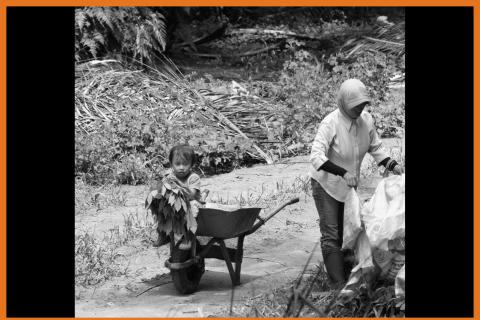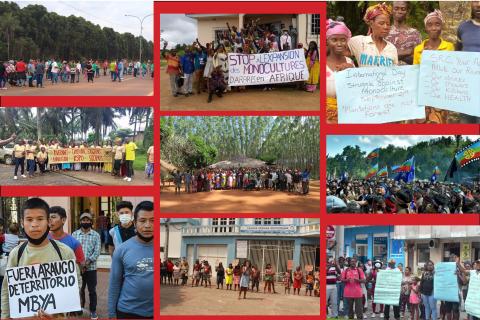This March, we remember a bulletin that denounces the layers of oppression that women living around plantations confront.
Bulletin articles
What governments agree (or don't agree) on during the UN climate summits is not that relevant in the real world of carbon market expansion. Companies, governments, conservation NGOs, consultancies, brokers, banks and many other interested players are working hard to establish carbon market schemes as ‘the only way forward’.
Oil palm plantations are a central cause of deforestation in southeast Mexico. A network of women in Chiapas have organized to denounce the tactics of coercion and deception employed by the State and companies to get peasants to accept this monoculture on their lands. Their struggle is for the land, for their knowledge, and for their voices to be heard.
In 2022, WRM, along with other allies, spoke with several authors from the publication, “15 Years of REDD: A Mechanism Rotten at the Core”. The aim was to reflect on the different layers of harmful impacts that REDD has caused over the last 15 years. Here is a summary of each contribution.
Oil palm plantation company Socfin has meant violence and oppression for affected communities in several African countries. Sierra Leone is no exception. In collaboration with Aminata Finda Massaquoi, a journalist and the national coordinator of the women’s advocacy network WORNAPI, WRM is releasing a podcast to highlight the voices of women living with the impacts of industrial plantations.
Brazil and Indonesia share a particular similarity: at some point its rulers decided to build a new capital city. While rulers in Brazil built Brasilia some 60 years ago, construction of the new Indonesian capital is currently underway. Both projects reinforce a colonial State, in spite of their promoters claiming the opposite. Both stories however, also show the role of social struggles as a way to revert a history of colonialism. (Available also in Bahasa Indonesia)
In line with certain aspects of a recent WRM study, we show how four REDD projects in the municipality of Portel, in the state of Pará in the Brazilian Amazon, contribute to perpetuating certain fantasies inherent to the idea of carbon trading through the REDD mechanism.
Most of the causes of deforestation that were identified in a UN-led global analysis from 1999 continue to exist. Yet, the “solutions” proposed since then have become new underlying causes of deforestation. In this scenario, projects that destroy the forest and “green” projects depend on each other in order to be viable.
This bulletin highlights materials and analysis related to communities’ struggles against industrial tree plantations. It also pays homage to communities in DRC struggling to get their lands back from an oil palm company since colonial times. Their courageous struggle showcases the multiple layers of oppression and violations that result from the plantation model.
Industrial tree plantations have always been about corporate control over community fertile lands. The monoculture model inherently endangers communities’ survival, food sovereignty and autonomy, deepens the violence of patriarchy and racism while enforcing the same destructive and oppressive way of organizing land (and thus, people) as the one enforced during the colonial era.
The network that brings together movements, organizations and communities in the fight against tree plantations met in the Far South of the State of Bahia. This September 21st, it once again denounced the impacts of this violent and unjust model, which is based on large-scale plantations mostly for pulp export.
The oil palm plantations of BIDCO, a company partially owned by Wilmar, in Kalangala Island, Uganda, generated devastating impacts. The company plans to expand to Buvuma Island, however, they keep confronting strong organized opposition! Watch a short video with testimonies of resistance from Buvuma Island.











